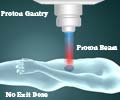Differentiation therapy can convert aggressive rhabdomyosarcoma cells into healthy muscle cells - a game-changer in pediatric cancer treatment.
- Differentiation therapy shows promise in converting aggressive rhabdomyosarcoma cells into functioning muscle cells
- Genome-editing techniques identified the critical role of the NF-Y protein in this cellular transformation
- The approach holds potential for other cancer types, marking a significant advancement in cancer treatment
Myo-differentiation reporter screen reveals NF-Y as an activator of PAX3-FOXO1 in rhabdomyosarcoma
Go to source). They have successfully converted rhabdomyosarcoma cells into normal, healthy muscle cells.
Cellular Shift: From Cancerous Growth to Muscle Contraction
“Every successful medicine has its origin story. And research like this is the soil from which new drugs are born,” said Cold Spring Harbor Laboratory Professor Christopher Vakoc. "The cells turn into muscle," Vakoc said. "The tumour loses all cancer attributes. They're switching from a cell that just wants to make more of itself to cells devoted to contraction. Because all its energy and resources are now devoted to contraction, it can't go back to this multiplying state," he added.Differentiation Therapy Targets Pediatric Cancer
Cancer occurs when cells divide uncontrolled and begin to destroy human tissues. Rhabdomyosarcoma is a form of cancer that typically affects children and teenagers. It begins in the skeletal muscle when cells mutate and begin procreating and spreading throughout the body. Differentiation therapy, which originated when scientists discovered that leukemia cells are not mature, akin to undifferentiated stem cells that have not yet comprehensively matured into a specific cell type, has shown promising outcomes for the fatal pediatric malignancy.This therapy forces such cells to develop further and differentiate into certain mature cell types.
NF-Y's Potential to Transform Cancer Cells
Vakoc and his colleagues developed a novel genetic screening approach. The researchers used genome-editing techniques to track the genes that when damaged, compelled RMS cells to become muscle cells.Then a protein known as NF-Y entered the picture. The scientists discovered an astonishing mutation after damaging NF-Y. The newly identified link between NF-Y and RMS may put in motion the chain reaction required to deliver differentiation treatment to patients. The technology may potentially apply to other types of cancer. If this is the case, scientists may one day discover ways to convert other tumors into healthy cells.
“This technology can allow you to take any cancer and go hunting for how to cause it to differentiate,” Vakoc explains. “This might be a key step toward making differentiation therapy more accessible.”
Reference:
- Myo-differentiation reporter screen reveals NF-Y as an activator of PAX3–FOXO1 in rhabdomyosarcoma - (https://www.pnas.org/doi/10.1073/pnas.2303859120)













